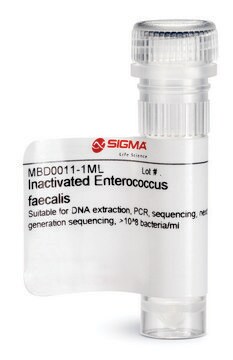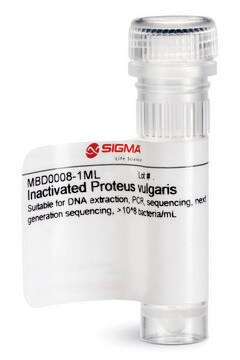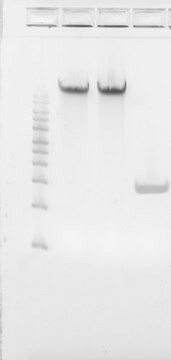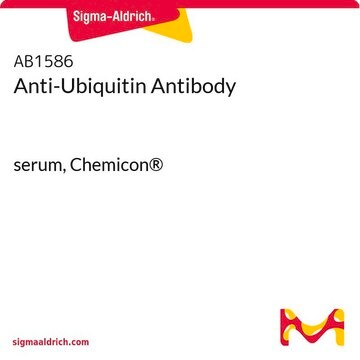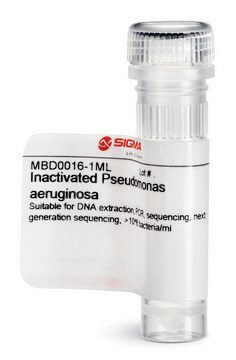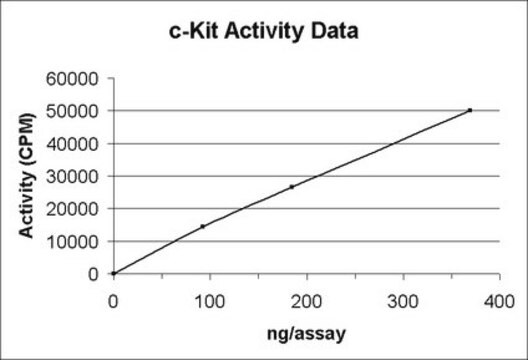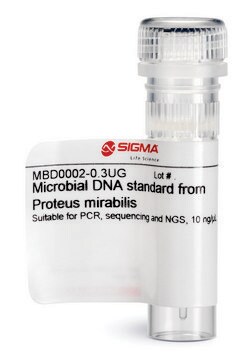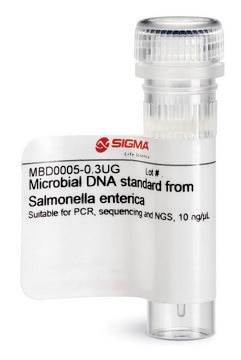おすすめの製品
品質水準
フォーム
liquid
濃度
>10^8 bacteria/ml
テクニック
DNA extraction: suitable
DNA sequencing: suitable
PCR: suitable
輸送温度
dry ice
保管温度
−20°C
関連するカテゴリー
詳細
Standardization of sample analysis is currently neededin microbiome genomics research workflow. Lack of standardization can lead tobiases and errors in common processes during sample preparation and analysissuch as sample amplification, sequencing and bioinformatics analyses.1 Inactivated Proteus mirabilis can serve as standard for benchmarking theperformance along the workflow of microbiomics or meta-genomics analyses and asa tool to increase reproducibility and allow comparison of results obtained bydifferent labs.
Proteusmirabilis is a gram negative facultative anaerobicrod-shaped bacterium. Bacteria of the genus Proteus of the familyEnterobacteriaceae are opportunistic human pathogens responsible for wound andburn infections as well as skin, eye, ear, nose, throat, urinary tract, andgastrointestinal infections and bacteremias.2 The most common infection involving P. mirabilis occurs when the bacteria, which is a memberof the natural intestinal flora, moves to the urethra and urinary bladder causingurinary tract infection. The outer-membrane lipopolysaccharide (LPS) isconsidered an important virulence factor of Proteus.3 Arabski et al. suggest that theimmunological response against P. mirabilis LPS might play a role in rheumatoidarthritis.4 A possible correlation between the abundanceof P. mirabilis in the intestine and obesity was suggestedrecently.5
Read here how to use our standards to ensure data integrity for your microbiome research.
Proteusmirabilis is a gram negative facultative anaerobicrod-shaped bacterium. Bacteria of the genus Proteus of the familyEnterobacteriaceae are opportunistic human pathogens responsible for wound andburn infections as well as skin, eye, ear, nose, throat, urinary tract, andgastrointestinal infections and bacteremias.2 The most common infection involving P. mirabilis occurs when the bacteria, which is a memberof the natural intestinal flora, moves to the urethra and urinary bladder causingurinary tract infection. The outer-membrane lipopolysaccharide (LPS) isconsidered an important virulence factor of Proteus.3 Arabski et al. suggest that theimmunological response against P. mirabilis LPS might play a role in rheumatoidarthritis.4 A possible correlation between the abundanceof P. mirabilis in the intestine and obesity was suggestedrecently.5
Read here how to use our standards to ensure data integrity for your microbiome research.
アプリケーション
Inactivated bacteria are provided at >10^8 bacteria/ml concentration in TE buffer pH 8.0. It is recommended to avoid freeze thaw cycles of this product.
Suitable for Quantitative standard for PCR, Sequencing and NGS
Suitable for Quantitative standard for PCR, Sequencing and NGS
特徴および利点
- Individual microbial standard for microbiomics and meta-genomics workflow
- Suitable standard for PCR, sequencing and NGS
- Improve Bioinformatics analyses
- Increases reproducibility
- Compare results lab to lab
物理的形状
Liquid -The inactivated bacteria is provided at >10^8 bacteria/ml in TE buffer pH 8.0
保管分類コード
10 - Combustible liquids
WGK
WGK 2
引火点(°F)
Not applicable
引火点(℃)
Not applicable
適用法令
試験研究用途を考慮した関連法令を主に挙げております。化学物質以外については、一部の情報のみ提供しています。 製品を安全かつ合法的に使用することは、使用者の義務です。最新情報により修正される場合があります。WEBの反映には時間を要することがあるため、適宜SDSをご参照ください。
Jan Code
MBD0007-BULK:
MBD0007-1ML:
MBD0007-1ML-PW:
MBD0007-VAR:
最新バージョンのいずれかを選択してください:
資料
Turn to our Next-Gen Sequencing Oligos (NGSO) as a potential solution if you are experiencing high levels of adapter dimer formation with custom adapters sourced from other vendors.
DNA standards enhance metagenomics research integrity, offering precise species study and mixed community standards.
ライフサイエンス、有機合成、材料科学、クロマトグラフィー、分析など、あらゆる分野の研究に経験のあるメンバーがおります。.
製品に関するお問い合わせはこちら(テクニカルサービス)
